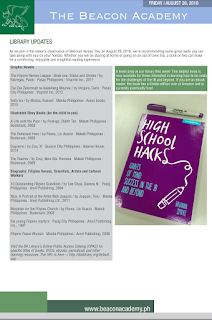 |
| Teacher and artist, Rolly Delos Santos |
My recent PAASCU Accreditation visit to De La Salle Santiago Zobel (DLSZ) was a learning experience, as all accreditation visits are, at least for me. For newbies to the PAASCU visit, this would seem like an inspection done by experts. For the seasoned ones, the PAASCU experience is an exercise where both parties, the school seeking accreditation and the accreditors, learn from. It is, in one way, a means toward professional development. Looking at the bigger picture, the accreditation process can be likened to a conversation and colloquim of educators seeking ways to learn continuously in an ever changing world.
This PAASCU experience made me think of the future of school libraries and how technology is changing its purpose as fast as drifting sand. How are LIS professionals, the young and especially the seasoned ones coping? This is a question that can't be answered in one sitting. This would require a connect the dots process and tons of research, on the field and in libraries.
I share with you now what I took with me after this PAASCU visit.
For one, reading through the report is an analytical task. One way to develop critical thinking is to look at criteria and read reports that justify, qualify and explain the evaluation rating assigned per criterion. Going through exhibits and conducting interviews are additional tasks that further lead to this kind of thought process. As I tend to think globally on most times, depending on my emotions to make decisions and feeling my gut to take on an action the analysis work of accreditation provides the needed balance in thought and thinking. The brain has the left and the right sides. Learning how to tap into both hemisphere takes time to develop and practice.
Visiting different libraries through PAASCU work gives me a sense of how things are in Philippine school libraries. This is a big data I often file somewhere in my mind. I pull some of it out when the need arises. Like, when I give talks and conduct workshops. I see many kinds of school libraries. I talk to many school librarians. The experience is both amazing and overwhelming. I come face to face with problems of many school librarians. The challenges are huge. I tell myself to hang on because, really, there is no better time to be a school librarian in the Philippines but today. A lot of things are happening. Giving up is not an option.
 |
| Jay Diola, Librarian of DLSZ |
Meeting friends and making new ones are experiences I enjoy during a PAASCU visit. In DLSZ, I met librarian friends and colleagues. I met Tito Rolly Delos Santos, finally. I first learned of him ten or eleven years ago during the first iBlog. He attended the iBlog conference as a newbie. We both were green horns in the conference among younger bloggers who have taken into blogging like fish to water. Thank God for the blogosphere and social media, we are able to keep in touch. I asked him for how long he has been with DLSZ. With a proud smile, he said he has been teaching in DLSZ for three decades already. That is a lifetime! It was nice of him to bring me to the grade school library to meet another good friend of mine. We did not miss the collage of St. John La Salle in the high school library though. This work of art is his masterpiece!
I have also picked up some marketing ideas along the way. Asking permission from librarian friends there, I will adapt and modify these strategies.
Since DLSZ is subscribed to Overdrive, their shelves have bookmakers on books that have ebook versions and audio book counterparts in Overdrive. The DLSZ library also has a Learning Commons. While some may think that this is merely a space or a room for interactivity, there is a philosophy and a pedagogy behind its presence and practice. I think this is another trend that needs thinking through before implementing and adapting it in school libraries. Will I put one in our school library? Study the possibility.
 |
| Book Menu of the Day |
What I find cute and easy to do is the Book Menu. This reading promo/display can actually be a bibliotherapy book promotion. What the DLSZ librarians did was to set up the Chicken Book for the Soul series like a menu from a restaurant or cafe. Imagine serving books as food for the soul? Sounds exciting, right? I can get to talk about books I have read that have bibliotherapy value to readers. I will be definitely be blogging about these reading promos and how I adopt and adapt them in my work place. Watch out for it!
Apart from these reflections and experiences, I had a closer look at Blended Learning, UbD and the outreach programs of DLSZ. Big ideas that need to be eaten like an elephant.






















